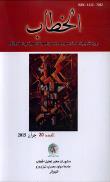Accueil > Langues et littérature > الخطــــاب > N°20 > N°20

N°20
Articles de cette rubrique
La nouvelle « stratégie déontologique »de la presse écriteprivée algérienne oules non-dits au lecteur
Avec l’avènement de la nouvelle presse privée algérienne, on assiste à l’apparition d’une pléthore d’organes de presse écrite qui tentent chacun à sa manière de conquérir un lectorat de plus en plus nombreux. Pour y parvenir, divers procédés sont déployés ça et là à travers leurs surfaces rédactionnelles (...)
Révolution, épreuves initiatiques et symbolique du tissage dans Le Métier à tisser de Mohamed Dib
We propose in the present article a demonstration about the dimension of the weaving symbolic in Le Métier à tisser, the third part of the triptych of Mohammed Dib, published in 1957. In the light of a mythanalytic lecture (Gilbert Durand, Les Structures anthropologiques de l’imaginaire), we will (...)
African Epic Discourse in KatebYacine’sNedjma(1956)
The present paper examines KatebYacine’sNedjma (1956) in relation to its author’s cultural refinement within the theme of revolution where African Epic narrative forms and modernist mode of writing blend. More specifically, it analyses KatebYacine’s novel characters as an interesting paradigm of (...)
CulturalHybridation for Identity Construction : the case of the Algerian Secondary School EFL education
,
Viewed through the concept of cultural hybridity, the approach to language learning and communication triggers cultural contacts among language users. It places the Algerian learner in the position of a multi-language user (mother tongue, national language, school languages). This creates (...)
أفعال الكلام المنشئة للخطاب النبوي في ضوء نظرية أفعال الكلام
This study aims to analyse and identify the speech act in the prophetical dis-course that forms it. In our analysis that relied on a pragmatic approach, we have concluded that the relation between the coranic and prophetical discourses is specif-ic. Consequently, it seems necessary to review (...)
خطاب التّخييل يحاور خطاب التّفكير عبد الله العروي يساكن الخطابين
Human experiences are not empty of thinkers and philosophers since Aristotle and Al-Farabi, and Augustine and IbnRushd, Abu Hayyan Al tawhidi and Nietzsche, and had them in literary studies, because the literature is a fruit not anyone can taste, but everyone enjoy it .
One of these thinkers (...)
التفجّـع بين أبي بكر الصنوبري وموليار
Nul doute, que tout lecteur de la littérature française classique, remarquera quelle recèle en elle des traits littéraires, qu’on trouve dans la littérature abbaside, tel la ressemblance entre KelilawaDimna, de Abdullah Ibn Al-Moukafa’ (106-142 de l’hégire), et les fables de Jean da la Fontaine (...)
أفعال الكلام غير المباشرة لأسلوب النداء ودورها في استنطاق خبايا النفس لدى الشعراء القطريين
Vocative style “Nidaa” in the speech plays a vital role whatever. And often come out from the original appeal speech to lead to high-value rhetorical purposes. In fact, linguists have not overlook taking the role of the vocative style to the advancement of the level of speech, raising his (...)
تجلّيات الحسّ التراجيكوميدي في ملصقات عز الدين ميهوبي
This study deals with the manifestations of common A sense of the tragic and comic in the Poems AzzedineMihoubi)TRAGIECOMEDY)) Trajekoumidia( where it formed the phenomenon advantage prevailed over most of his poems produced in the poetic « posters » group with a diversity of experience and (...)
الانزياح من الكون إلى الذات قراءة في جمالية التشكيل
This paper deals with one of the terms that commonly used on the modern linguistic and stylistic studies ; this term is « deviation ». I have tried to study this phenomenon in the form of totalitarianism, as it is considered as a cosmic and psychological event rather than a stylistic text event. (...)
10/13 Articles
0 | 10
